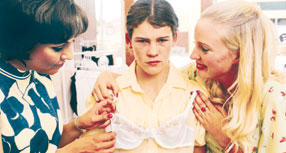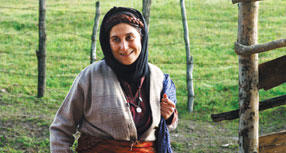
50 Ways of Saying Fabulous (Stewart Main) 31 – There’s not much in this New Zealand-set, gay coming-of-age story that makes it worth recommending. It starts out “cute” and stays there for the duration, making you question not only if any real growth in the characters has occurred at all, but also if writer/director Stewart Main has ever spoken to a child in his adult life. Even when it’s approaching sexual frankness or adding physical danger to the mix, it always tidies up afterwards with a coy, juvenile observation that essentially negates what we’ve just watched.
The movie, set in 1975, features two thirteen-year-old protagonists (one a tomboy, the other a latent homosexual), but to compare it to a movie like Thirteen suggests that it’s studying a different species entirely. That movie had a real sense of danger in its scenes of seduction. This is so consistently twee that it fails to convince as a character study. There’s an entire subgenre of movies like this one, and it seems like the most successful of them are so grounded in specificity and so well-observed that you can’t help but accept them as something honest and true. Despite Fabulous’ inescapably unique setting (it’s set on a farm during a drought), everything about it feels perfunctory. It’s too concerned with plot for its own good, always laying groundwork for later twists. It trots out secondary characters arbitrarily. The performances seem calculated less to help us understand the character than to stir up audience goodwill. The score alternates between obtrusive oboe and piccolo cues, ensuring we always know what to think.

Gilaneh (Rakhshan Bani-Etemad, Mohsen Abdolvahab) 45 – This one works better in theory than in practice, I’m afraid. The concept is pretty interesting: Its first half takes place during the 1988 bombing of Iran at the hands of Iraq, and then it switches its focus to 2003, where fifteen years later it’s Iraq being bombed at the hands of the United States. The movie should play as impassioned plea from the people of Iran, always seen suffering, but it’s too shallow to feel that important. Focusing on the titular character, who it presents as a somewhat hopeless and endlessly self-sacrificing martyr (she and her son blatantly refuse help from their government at one point), it ends up painting a weak picture of the Iranian people, if it’s meant to be taken as a national allegory.
The first half of the film, in which Gilaneh and her daughter travel to Tehran while it’s under siege, is a setup for disappointment. While watching it, I couldn’t help but be aware of the fact that the obviously limited resources of Iranian films would prevent us from ever seeing the war-torn capital. At one point, a woman graphically describes an instance where she saw a children’s hospital as it was bombed. Her verbal depiction of a child, still trying to suckle its dead mother’s breast, is haunting, but you can’t help but crave that visual. Unfortunately, such elaborateness is not within the movie’s means. Creative sound editing, graphic news footage, and the use of off-screen space help somewhat to relay the horrors that country is facing, but it’s too little to pack the punch that’s needed. The second part, which turns the movie into a chamber drama is less satisfying still, with the lead performance slipping into caricature, and the Iraqi conflict being too distant to have any emotional real impact (The characters experience the war on television, like the majority of the world.). It’s a noble movie. I just wish it were a better one.



No comments:
Post a Comment